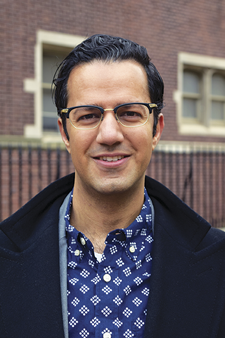 Dr. Fayyaz Vellani, Hill House Fellow
Dr. Fayyaz Vellani, Hill House Fellow
I moved to Penn from London, and my teaching appointment and house fellowship appointment were simultaneous, which was daunting and exciting. Since my arrival at Penn, my teaching practice and my experience of living in a College House have been deeply intertwined, and on reflection, I cannot imagine how one would function without the other.
Appointed as a fellow in Ware College House for my first year, I was thrown straight into the deep end, arriving one week before New Student Orientation, trying to orient myself to the campus and to prepare my teaching for the students who would soon make their way to these beautiful few blocks of West Philadelphia. That year was an immense learning experience for me. Although I had previously lived and worked in university residences as an undergraduate and graduate student, I had never before integrated my teaching experience into my living quarters. It is this integration – how my living in a College House informs my teaching practice and vice versa – which lies at the heart of my experience.
In subsequent years, I have served as a fellow at Hill College House, and have found the experience has helped me build many layers of community — with students, fellow faculty members and senior staff — and these layers have grown in strength and size. In the 2007-08 academic year, my fellow faculty colleagues and I screened over fifty events for the Presidential Election, including all debates and primaries for both political parties. We found that the discussions with students grew richer and deeper over time. Often, we acted as facilitators rather than lecturers; students would ask complex questions about taxation or health care policy or climate change, and we would respond with more questions for them, probing deeper in order to help them learn their own minds. Over that year, this series of screenings became one long, sustained conversation. In the fall semester of 2008, students who had been freshmen during the previous academic year returned to Hill to watch the general election debates with us, which made me wonder, “what is it about this place that entices students to return?”
Over the years, we have held workshops, talks, reading group discussions, film screenings, parent breakfasts during Family Weekend, walking tours, trips to Reading Terminal Market, many meals and yes, I have answered knocks on my door from students who are panicking about a writing assignment, or need a letter of recommendation, or who just want to chat. The ease with which faculty, staff and students interact in the College Houses is something which is unique to Penn, in my experience. It’s a contemporary version of the traditional English model of a university, which included pastoral and educational roles for faculty members. Perhaps College House Fellows do not serve as in loco parentis but rather in loco doctorem (Latin for ‘teacher’). Students’ respect for faculty members is augmented by their seeing us outside of classroom settings. As College House Fellows, we view students and their struggles with more empathy and compassion. There is something humbling and ennobling about living in a community of students and faculty members. Students approach me with an ease with which I wish I had been able to approach professors when I was an undergraduate. I plan my teaching with firsthand knowledge of undergraduate life at Penn, adding depth and nuance to how I interact with students in the classroom. The fact I have conducted rounds of Fling Patrol in the Quad gives me cachet with students; the fact that they see me in the dining hall makes them think about learning even when they are outside of the classroom.
Year after year, students and RAs return to visit the house, fond of their time here, replete with happy memories, and pointing to the formative role of the college house system in their development as a citizen. That I was present at that crucial time, and perhaps able in some small way to nudge them towards independence, self-fulfillment and getting the most out of their undergraduate educational experience, is reason enough for me to continue living in a College House. The student who went on to law school, the student who founded a nonprofit, the student who studied abroad, all of whom thanked me for influencing them or helping them to achieve their goals — these are all additional rewards for which I am grateful. The final realization I have is that my own development as a faculty member has been greatly enhanced by my having lived and worked in a college house. College Houses, though fun places, also serve as learning labs — students get to talk about important issues with faculty members in a non-classroom setting — and faculty members also get to test out new ideas and methods in the same setting. It is a mutually beneficial system, and just as students cannot imagine their Penn experience without having lived in a College House, neither can I.


 Search
Search